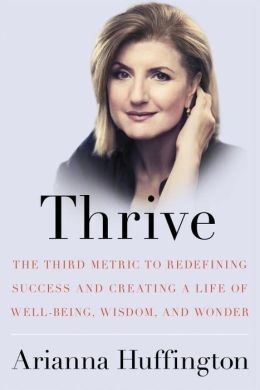More on this book
Community
Kindle Notes & Highlights
Thrive: The Third Metric to Redefining Success and Creating a Life of Well-Being, Wisdom, and Wonder
Read between
April 2 - April 3, 2017
there’s more to life than climbing the ladder, that we are more than our résumés, and that we don’t have to buy into the collective delusion that burnout is the necessary price we must pay for success.
Researchers from Harvard and the University of Virginia did an experiment in which they gave people a choice to be alone in a room, without anything—devices, books, papers, phones—or get an electric shock. 67 percent of men chose an electric shock. I’m very happy to say that only 25 percent of women chose the shock.
It’s not a surprise that when we define ourselves solely by our work and that work is taken away, we can find ourselves feeling lost and adrift,
Over time our society’s notion of success has been reduced to money and power.
a growing body of data shows that the price of the current false promise of success is already higher for women than it is for men. Women in stressful jobs have a nearly 40 percent increased risk of heart disease, and a 60 percent greater risk of diabetes.
Over 30 percent of people in the United States and the United Kingdom are not getting enough sleep.
we need to redefine what we value, and change workplace culture so that working till all hours and walking around exhausted become stigmatized instead of lauded.
There is a purpose to our lives, even if it is sometimes hidden from us, and even if the biggest turning points and heartbreaks only make sense as we look back, rather than as we are experiencing them.
that, yes, child care and elder care were cited most often as the reasons women left. But after those, the motivation most often given was lack of engagement or enjoyment in the job.
Turner writes, for women to be engaged in the workplace, they need to feel valued. And the way many workplaces are set up, masculine ways of succeeding—fueled by stress and burnout—are often accorded more value.
Germany lost fifty-nine million workdays to psychological illness in 2011, up over 80 percent in fifteen years.
“The lack of attention to employee needs helps explain why the United States spends more on healthcare than other countries but gets worse outcomes,”
Scientists from Harvard and Northeastern Universities found that meditation “made people willing to act virtuous—to help another who was suffering—even in the face of a norm not to do so.”
Padmasree Warrior, the chief technology officer of Cisco, calls meditation “a reboot for your brain and your soul.” She meditates every night and spends her Saturdays doing a digital detox. Warrior drew on her meditation practice to manage twenty-two thousand employees in her previous role as Cisco’s head of engineering.
We also have two nap rooms in our newsroom, which are now full most of the time, even though they were met with skepticism and reluctance when we installed them in the spring of 2011.
among European countries, Greece was number one in hours worked, Poland was second, and Hungary third. Their productivity rankings, however, were eighteenth, twenty-fourth, and twenty-fifth (dead last). Working the fewest hours were the Dutch, Germans, and Norwegians, who came in at fourth, seventh, and first in productivity.
Right now, about 35 percent of large and midsize U.S. employers offer some sort of stress-reduction program, including Target, Apple, Nike, and Procter & Gamble.
Compassion can and should be taught, not only throughout a child’s K–12 curriculum, but in higher education and corporate learning and development programs as well.”
As the Great British Sleep Survey found, poor sleepers are seven times more likely to feel helpless and five times more likely to feel alone.
time.… So, when people think “I’m rushing around to get things done,” it’s almost like, biologically, they’re rushing around just as if they were escaping from a predator. That’s the part of the brain that’s active. But nobody can run fast enough to escape their own worries.
Even our worst enemies don’t talk about us the way we talk to ourselves.
It all starts with setting the expectations that make it clear that no matter how much hardship we encounter—how much pain and loss, dishonesty, ingratitude, unfairness, and jealousy—we can still choose peace
“We aren’t separate from everything else; when we suffer, others suffer. Our well-being is the well-being of others.
Forgive yourself for any judgments you are holding against yourself and then forgive your judgments of others.
“I have found that the only thing that does bring you happiness is doing something good for somebody who is incapable of doing it for themselves.”


